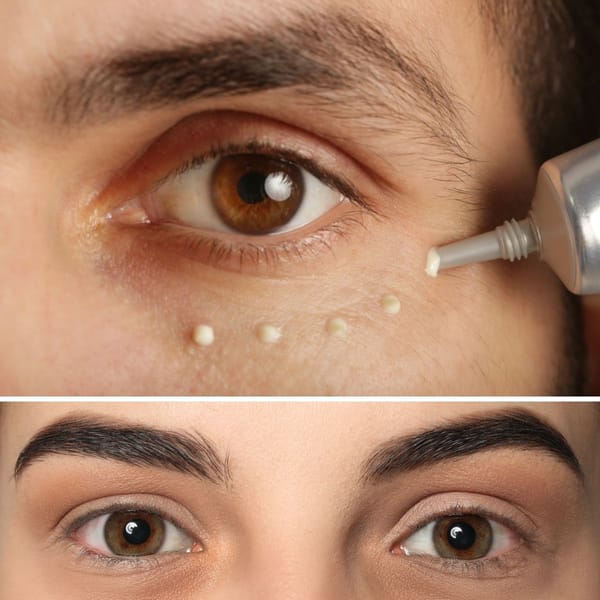Dry skin on the hands can be more than just a cosmetic concern; it can lead to discomfort, itchiness, and even painful cracking. Understanding what dermatologists recommend for extremely dry skin on hands is crucial for maintaining healthy, comfortable skin. This comprehensive guide will delve into the expert advice and treatments that can transform your skin from parched to perfectly moisturized.
Key Takeaways:
- Dermatologists recommend a combination of protective measures and targeted treatments for extremely dry skin on hands.
- Key ingredients in hand creams and moisturizers, such as ceramides and hyaluronic acid, are essential for restoring the skin's barrier function.
- Consistent application of the right products and adherence to skin-friendly habits can significantly improve skin dryness and prevent future issues.
Understanding Extremely Dry Skin on Hands
Extremely dry skin on the hands, also known as xerosis, can be caused by various factors, including environmental conditions, harsh soaps, and underlying skin conditions. Dermatologists emphasize the importance of identifying the root cause to effectively treat dry skin. Sensitive skin types, in particular, require gentle care to avoid exacerbating the problem.
The skin's natural oils play a vital role in maintaining moisture and protecting against irritants. When these oils are stripped away, the skin's surface becomes vulnerable, leading to increased skin dryness and the potential for cracked skin. Restoring these oils and the skin barrier is a top priority in dermatological care for dry hands.
The Role of Moisturizing Creams
Moisturizing creams are the cornerstone of treating dry skin. Dermatologists often recommend creams that contain ingredients like shea butter, ceramides, and hyaluronic acid to lock in moisture and repair the skin barrier function. These ingredients help to soothe dry skin and provide long-lasting hydration.
When selecting a hand cream, it's important to choose one that is fragrance-free and designed for sensitive skin to minimize the risk of irritation. Moisturizing creams should be applied regularly, especially after hand washing, to maintain skin hydration and prevent the recurrence of dryness.
The Importance of Gentle Cleansing
Harsh soaps and hand sanitizers can strip the skin of its natural oils, exacerbating dryness. Dermatologists recommend using mild soaps and moisturizing soaps that are free from harsh chemicals. These products help to cleanse the skin without compromising its natural barrier.
For those with extremely dry skin, it may be beneficial to use a therapeutic hand cream immediately after washing. This helps to replenish moisture and protect the skin from further moisture loss. Warm water is preferred over hot water, as high temperatures can also contribute to skin dryness.
Customizing Your Hand Care Routine: Beyond the Basics
When it comes to treating extremely dry skin on your hands, dermatologists often recommend tailoring your skincare routine to your specific skin condition. For those with sensitive skin, it's crucial to choose hand creams that are fragrance-free and formulated with gentle ingredients. Products containing hyaluronic acid and ceramides can help lock in moisture and restore the skin's barrier function. For eczema-prone skin, creams with colloidal oatmeal can soothe itchiness and irritation. It's not just about applying moisturizer; it's about finding the right one that caters to your skin's unique needs.
In addition to selecting the right products, incorporating natural oils like jojoba oil or coconut oil into your routine can provide an extra layer of protection and hydration. These oils mimic the skin's natural oils, helping to soothe dry, flaky skin without leaving a greasy residue. For very dry skin, consider using thicker creams or ointments that contain fatty acids and mineral oils at night to deeply nourish the skin while you sleep. Remember, the goal is to create a personalized regimen that addresses your skin's specific concerns and enhances its overall health.
Embracing Lifestyle Adjustments for Healthier Hands
Lifestyle changes can significantly impact the health of your skin, especially when dealing with extremely dry cracked hands. Simple adjustments like wearing gloves during cold weather or while doing household chores can protect your hands from harsh chemicals and hot water that exacerbate dryness and irritation. Similarly, minimizing hand washing with harsh soaps and opting for a moisturizing soap can prevent stripping away natural oils, reducing skin tightness and discomfort.
Hydration isn't just about what you put on your skin; it's also about what you consume. Increasing your water intake ensures that your body, including your skin, is adequately hydrated from the inside out. Additionally, incorporating foods rich in omega-3 fatty acids, such as fish or flaxseeds, can help strengthen the skin barrier and promote healthy skin. By making these conscious lifestyle choices, you can effectively treat dry skin and maintain the softness and resilience of your hands.
Protecting Hands from the Elements
Environmental factors like cold weather and sun exposure can take a toll on the hands. Wearing gloves is a simple yet effective way to shield the skin from harsh conditions. Dermatologists advise using gloves during outdoor activities and when using cleaning products to prevent skin irritation and moisture loss.
For sun protection, applying a moisturizer with SPF or a dedicated sunscreen can help prevent dark spots and damage caused by UV rays. Maximum sun protection is essential, even on cloudy days, to maintain healthy skin and prevent premature aging.
Ingredients That Heal and Soothe
Natural oils such as coconut oil and jojoba oil are often recommended by dermatologists for their ability to soothe dry skin and reinforce the skin's barrier. These oils are rich in fatty acids that help to nourish and heal dry, flaky skin.
Colloidal oatmeal is another ingredient known for its skin-soothing properties. It can relieve itchiness and irritation associated with dry skin and conditions like eczema. Products containing colloidal oatmeal can be particularly beneficial for eczema-prone skin.
The Power of Hydration
Hydration is key when it comes to treating dry skin. Drinking plenty of water and maintaining a healthy diet rich in omega-3 fatty acids can support skin health from the inside out. Dermatologists also recommend using products with hyaluronic acid, which can hold up to 1000 times its weight in water, to deeply hydrate the skin.
In addition to topical treatments, using a humidifier in the home can help to add moisture to the air, particularly during the dry winter months. This can prevent skin dryness and promote a more comfortable environment for sensitive skin.
When to Seek Professional Help
If over-the-counter treatments and home remedies are not providing relief, it may be time to consult a dermatologist. They can prescribe a prescription cream or recommend thicker creams with active ingredients tailored to your specific skin condition.
Dermatologists can also provide guidance on lifestyle changes and protective measures to prevent dry skin from recurring. In some cases, they may suggest procedures or treatments to address severe skin dryness or related conditions.
Summary
Extremely dry skin on the hands is a common issue that can be effectively managed with the right approach. Dermatologists recommend a combination of protective measures, gentle cleansing, targeted moisturizing creams, and ingredients that repair the skin barrier. By following these expert tips and incorporating skin-friendly habits into your daily routine, you can achieve and maintain soft, healthy hands.
FAQ Section
Q: What is the best hand cream for extremely dry skin? A: Dermatologists often recommend hand creams that contain ceramides, hyaluronic acid, and natural oils like shea butter and jojoba oil. Look for fragrance-free, non-greasy formulas that are designed for sensitive skin, such as CeraVe Therapeutic Hand Cream.
Q: How often should I apply moisturizer to my dry hands? A: It's best to apply moisturizer immediately after washing your hands and regularly throughout the day, especially if you're experiencing skin tightness or dryness. For extremely dry skin, you may need to moisturize several times a day to maintain hydration.
Q: Can diet affect the dryness of my skin? A: Yes, a diet rich in omega-3 fatty acids, which are found in foods like fish and flaxseeds, can help support healthy skin. Staying hydrated by drinking plenty of water is also crucial for maintaining skin moisture levels.







